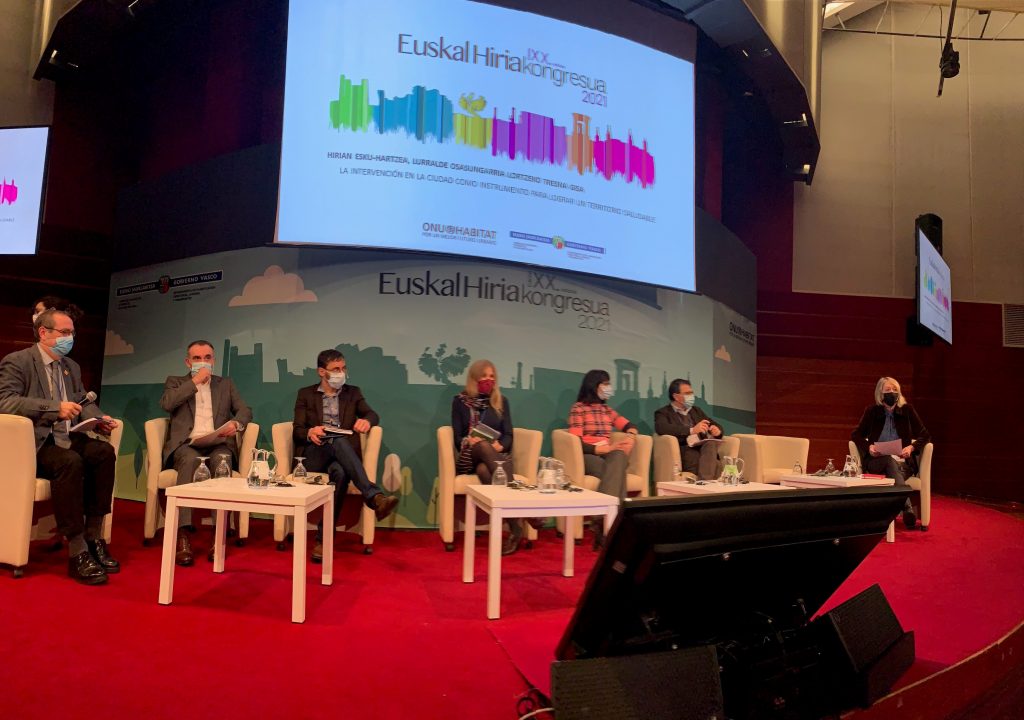- This forum, organised by the Basque Government and UN-Habitat at the end of November, stressed the need to recover cities, focusing on social and environmental aspects.
The Euskal Hiria congress held its twentieth edition this year. It is a classic event for experts in territorial planning, an area in which the Basque Country has excelled in recent decades. On this occasion, the focus was on the social and environmental transformation of cities, and it focused on specific cases of urban regeneration in vulnerable areas of the Basque Country, especially the Opengela model.
The importance of urban regeneration took centre stage at this congress held in Vitoria-Gasteiz. In a keynote speech, Ignacio de la Puerta, Director of Territorial Planning and Urban Agenda of the Basque Government, explained the need to «recover cities». A study by the Government itself reveals that, despite the last 40 years of public investment, «30% of the Basque Country’s neighbourhoods are in conditions of high or very high vulnerability», as well as «the relationship between vulnerability and health».
To tackle this situation, the Basque Government has proposed a PERTE (Strategic Project for Economic Recovery and Transformation) for integral urban regeneration, a project open to multiple agents to intervene in 47 municipalities. To carry it out, it is proposed to «extend the Opengela model», funded by the European Commission.
Ignacio de la Puerta, Director of Territorial Planning and Urban Agenda of the Basque Government, stressed the importance of generating «trust» with the neighbourhood, «raising awareness of the benefits of intervention to improve comfort and habitability», carrying out a «diagnosis of economic, social and cultural aspects», promoting employment opportunities and «offering a space for meeting and trust that functions as a one-stop shop». In this sense, the Opengela model promotes the creation of proximity offices in each neighbourhood, which accompany the neighbourhood in the process of urban regeneration». He also pointed out the novelty that it provides «fair and affordable financing for all».
On the opening day, Iñaki Arriola, Basque Government Minister of Territorial Planning, Housing and Transport, encouraged us to «consider the promotion of new urban models that allow the different fabrics that make up our cities to coexist and improve their interrelation with the rural and natural environment, through a new configuration and use of public spaces and a new mobility».
To achieve this, the Basque Country has equipped itself with a fundamental tool: the Bultzatu 2050 Urban Agenda, one of the first to be drawn up at regional level and which is aligned with the United Nations New Urban Agenda and the Sustainable Development Goals (SDGs). In this regard, Iñaki Arriola highlighted urban regeneration as a way to achieve «the transformation of cities towards fairer and more sustainable cities».
The Basque Country already has several experiences in this area, which involves not only the rehabilitation of buildings, the improvement of energy efficiency and the accessibility of housing, but with a broader sense and consequences in social, economic, environmental and governance aspects. Opengela served as an example on several occasions for the speakers at the congress.
During Euskal Hiria, the head of UN-Habitat’s Spain office, Carmen Sánchez-Miranda, stressed that «if the Sustainable Development Goals are the What, the urban agendas are the How. UN-Habitat has been accompanying the Basque Agenda Bultzatu 2050 since its creation, convinced that the territorial level is a key level in the processes of implementation, coordination and promotion of effective governance, and that the role of sub-national governments is just as important as that of the national and local levels in this regard».
The head of UN-Habitat in Spain added that «the way in which towns and cities recover from the pandemic will have a major impact on global efforts to achieve a sustainable future for all (…) the Sustainable Development Goals are precisely the articulating rails capable of ensuring that the short lights of the emergency are aligned with the long lights of development». Euskal Hiria served as a contrast between experiences at a more local level and others at a global level.


